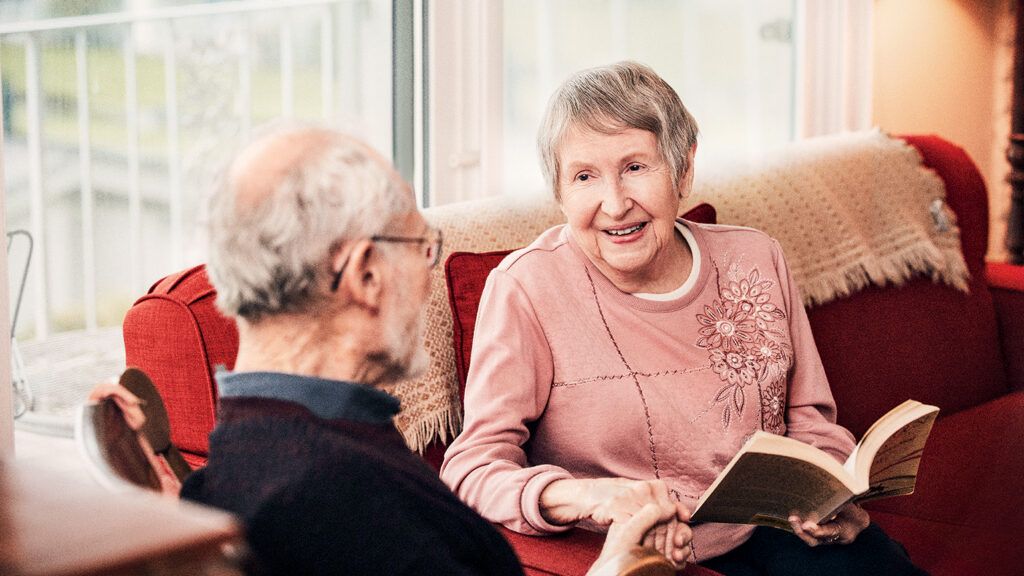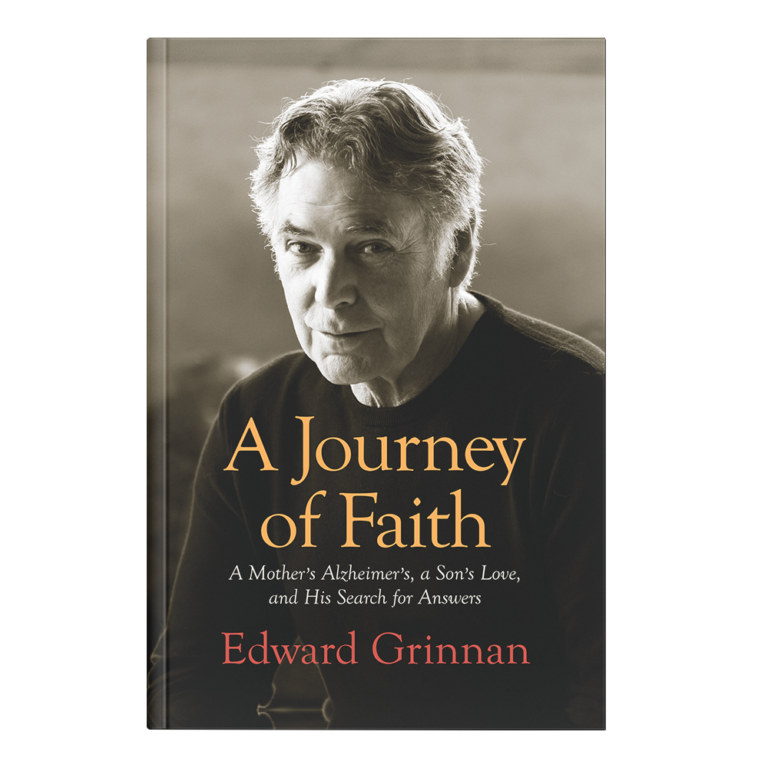I woke with a start one night last February when my husband, Bill, came into my room at midnight. He was leaning weakly against the doorway. “I need to go to the hospital,” he said.
“What’s wrong?” I asked. “What happened?” Bill had attended a piano concert with friends near our Seattle home that night. I’d stayed in and gone to bed before he got home.
“The last thing I remember is getting out of the car and Dean driving away,” Bill said, his face ashen. “Then I woke up lying on my bed, still dressed.” I called 911 and pulled on my clothes. I was worried sick. Why had Bill blacked out?
When we went outside to the ambulance, I saw Bill’s hat and glasses lying on the icy ground in front of our condo. I asked the EMT to pick them up. In the ER, they told us Bill had broken the mastoid section of the temporal bone by his ear and suffered a concussion. Because he couldn’t recall the accident, the doctors kept him overnight for tests, but all they found was an irregular heartbeat—something that could be controlled with medication. As far as any of us could figure out, Bill had just slipped on the ice and fallen, hitting his head on the ground.
What kind of person walks carelessly on icy pavement? I thought. I knew to step carefully, as if walking on eggshells. Why didn’t he? Especially at this stage of our lives—he and I were both 83—and with two daughters and five grandchildren who worried about us. But I didn’t say anything to him. What good would it do?
When Bill volunteered, “I should have been more careful,” I sat in stony silence. Even after his admission, I felt annoyed and resentful, but I pushed those feelings down. After all, we were each other’s caregivers. I have a minor congenital heart condition that could worsen, and in the past decade, Bill has battled both prostate and skin cancer. We stick close together for emotional—and actual—support.
One afternoon at the end of July, almost six months later, we were on a bus headed to Harborview Medical Center for Bill’s eye exam. As the bus started onto the Ship Canal Bridge, Bill stood up and walked the few steps to the front of the bus to pick up a new route schedule. Suddenly the driver braked. Bill, his arms flailing, vainly grabbed for the bars and straps, then fell hard backward.
I jumped up from my seat. “Are you all right?”
“Yes,” Bill said, from the floor, his voice feeble.
Two other passengers lifted Bill and helped him get to the nearest seat. I steadied myself and moved to sit beside him. “I think it’s my shoulder,” he said. “It hurts when I try to lift my arm.”
The driver found a place to pull over and came back to investigate. “Do you want us to call an ambulance?”
“No,” I said. “We were headed to Harborview anyway.”
Instead of the ophthalmologist’s office, we ended up in the ER. Again. What kind of person walks on a moving bus without holding on to something?
Once more, I said nothing to Bill, even when he said, “I should have held on to something.” This time, he’d broken his left humerus, the long bone in the upper arm that forms part of the shoulder. He was fitted with a sling. He didn’t have to stay overnight, thank goodness. In the weeks that followed, I found my resentment growing, building on the annoyance I’d felt when he’d fallen on the ice.
It wasn’t that Bill complained all the time; he didn’t. It wasn’t that he was a lot of trouble; he wasn’t. For a while, I had to do more driving, attend more medical appointments, do more of the jobs around the house that required two hands. Nothing major. Still. How on earth did Bill manage to get into these awful situations?
A few times, I asked God for help with those negative feelings, but this issue definitely wasn’t at the top of my prayer list. Given my husband’s repeated carelessness, I felt entitled to my attitude.
In the early fall, a couple months after Bill’s accident on the bus, I was finishing my daily breathing meditation—deep breath in, deep breath out—that I do after my prayers when I remembered something. An episode 60 years ago when I had also felt anger and resentment toward Bill. Funny, I hadn’t thought about it in years, and I didn’t know why I was thinking of it now. Things occasionally pop up during the breathing exercises after my prayers. Insights that turn out to be important. It’s as if, with those deep breaths, I’m clearing a space in my mind and heart that God’s wisdom might fill.
Bill and I had met during our junior year of college in Massachusetts. After graduation, he went back to Missoula, Montana, to start law school, and I got a job as a research and editorial assistant for a nonprofit in New York City. We wrote long letters. We missed each other terribly. I flew home to Crawfordsville, Indiana, for Christmas, and Bill drove there from Montana. He asked me to marry him, and I said yes. The following August, we were married in Crawfordsville. After the reception, Bill and I drove off across the country to Missoula in his old black Chevrolet.
Those first months in Montana were wrenching for me. I’d given up everything, everyone, every place I’d ever known to be with my new husband. We socialized occasionally with Bill’s law school friends and their wives, but still I was lonely. That spring, Bill spent several grueling weeks preparing for his final exams, weeks in which I tiptoed around the house, made sure he ate and rested, and put up with his bad moods. I couldn’t wait to celebrate with a nice dinner out when he was done with his exams.
On the Friday after finals were over, Bill announced he was taking off with classmates to play golf in a town a hundred miles away. “I’m not sure when I’ll be back,” he said.
I was too surprised and disappointed to say anything but “Okay.” So much for our celebration! But as soon as the door shut behind him, my anger boiled over. Clearly we had married too young. Bill wasn’t ready. All right then. We hadn’t been married long. The bonds between us were few and still loose. I would make my own plans. I had options! My New York roommates had both left the city, but maybe I could find an apartment there on my own. Even get my old job back. Or I could go home, back to Crawfordsville, and look for a job from there. That would show him.
When Bill walked in late the next afternoon, I greeted him and asked him how he was.
“Tired but fine,” he said.
“Well, I’m not fine,” I said. To my dismay, I broke down in tears. “How could you? I thought we were going to celebrate together!”
Bill looked sheepish. “We should have,” he said. “I’m sorry.”
“Instead, you ran off to party with your friends. I was so worried! You didn’t even call!”
“I should have,” Bill said. And he really did look sorry and confused, more by his own actions than by mine.
“I didn’t marry you to be left here by myself!”
“I wasn’t thinking straight,” he said. “It won’t happen again.”
And it didn’t. Although we’ve had our measure of challenges and disagreements, just like any other long-married couple, since that day Bill has always put our relationship first. So why was I remembering all of this now, 60 years later, when the circumstances were so different?
Then I realized that calm planning had not filled that long-ago weekend. What had filled it was fear. Fear of what could happen to a young man in a car with other young men, probably distracted and driving too fast. Fear of what would happen to me if Bill had not come back. I’d had no friends in Montana, no resources of my own. All I’d known and loved was far away. I’d felt abandoned.
The bonds between Bill and me may have been few and loose back then, but they certainly weren’t now. We were likely nearing the end of our long life together on earth. Every health scare, setback and accident reminded me of that fact. When Bill hurt himself as he had lately, when he blacked out… What if one day… I couldn’t bear to think about it.
By the time I finished my breathing exercises that day, I understood that what I’d been feeling that afternoon in 1959 and what I’d been feeling lately were the same thing. I had been afraid back then, and I was afraid right now.
What kind of person resents a loved one for getting hurt? A frightened one. The anger and resentment were my instinctive way of pushing down the deeper emotion of fear. In that moment, God gave me the clarity to make that important connection, and I felt closer to Bill. More empathetic. More tolerant. Had I ever come close to a bad fall? Too often. Usually I was the one with poor balance. Could I land in the ER soon? Absolutely.
Now whenever Bill says things like “I should have been more careful” or “It’s my own fault,” I take his hand in mine and remind him, “It could happen to anyone.”
And I feel grateful for each moment we have together.
Read More: 6 Ways to Cope with Caregiver Anger
For more inspiring stories, subscribe to Guideposts magazine.






